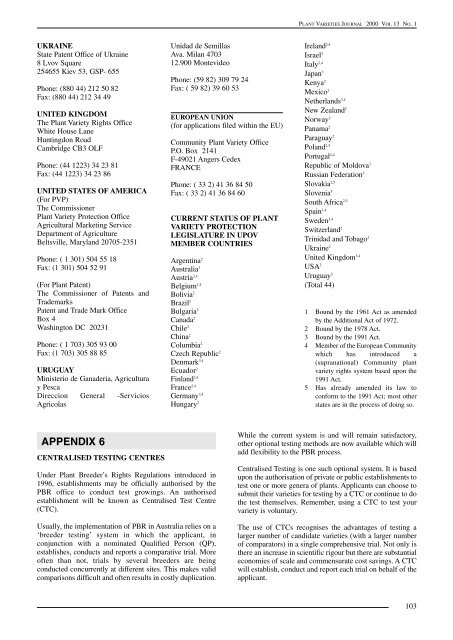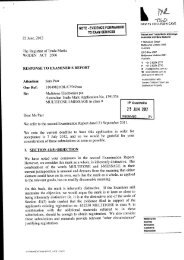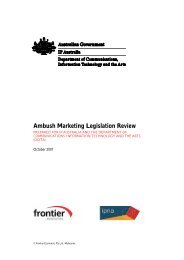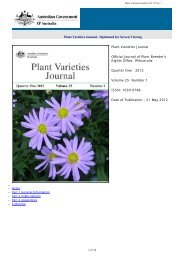53. Volume 13- Number 1 - IP Australia
53. Volume 13- Number 1 - IP Australia
53. Volume 13- Number 1 - IP Australia
Create successful ePaper yourself
Turn your PDF publications into a flip-book with our unique Google optimized e-Paper software.
PLANT VARIETIES JOURNAL 2000 VOL <strong>13</strong> NO. 1<br />
UKRAINE<br />
State Patent Office of Ukraine<br />
8 Lvov Square<br />
254655 Kiev 53, GSP- 655<br />
Phone: (880 44) 212 50 82<br />
Fax: (880 44) 212 34 49<br />
UNITED KINGDOM<br />
The Plant Variety Rights Office<br />
White House Lane<br />
Huntingdon Road<br />
Cambridge CB3 OLF<br />
Phone: (44 1223) 34 23 81<br />
Fax: (44 1223) 34 23 86<br />
UNITED STATES OF AMERICA<br />
(For PVP)<br />
The Commissioner<br />
Plant Variety Protection Office<br />
Agricultural Marketing Service<br />
Department of Agriculture<br />
Beltsville, Maryland 20705-2351<br />
Phone: ( 1 301) 504 55 18<br />
Fax: (1 301) 504 52 91<br />
(For Plant Patent)<br />
The Commissioner of Patents and<br />
Trademarks<br />
Patent and Trade Mark Office<br />
Box 4<br />
Washington DC 20231<br />
Phone: ( 1 703) 305 93 00<br />
Fax: (1 703) 305 88 85<br />
URUGUAY<br />
Ministerio de Ganaderia, Agricultura<br />
y Pesca<br />
Direccion General -Servicios<br />
Agricolas<br />
Unidad de Semillas<br />
Ava. Milan 4703<br />
12.900 Montevideo<br />
Ireland 2,4<br />
Israel 3<br />
Italy 2,4<br />
Japan 3<br />
Phone: (59 82) 309 79 24<br />
Fax: ( 59 82) 39 60 53<br />
EUROPEAN UNION<br />
(for applications filed within the EU)<br />
Community Plant Variety Office<br />
P.O. Box 2141<br />
F-49021 Angers Cedex<br />
FRANCE<br />
Phone: ( 33 2) 41 36 84 50<br />
Fax: ( 33 2) 41 36 84 60<br />
CURRENT STATUS OF PLANT<br />
VARIETY PROTECTION<br />
LEGISLATURE IN UPOV<br />
MEMBER COUNTRIES<br />
Argentina 2<br />
<strong>Australia</strong> 3<br />
Austria 2,4<br />
Belgium 1,4<br />
Bolivia 2<br />
Brazil 2<br />
Bulgaria 3<br />
Canada 2<br />
Chile 2<br />
China 2<br />
Columbia 2<br />
Czech Republic 2<br />
Denmark 3,4<br />
Ecuador 2<br />
Finland 2,4<br />
France 2,4<br />
Germany 3,4<br />
Hungary 2<br />
Kenya 2<br />
Mexico 2<br />
Netherlands 3,4<br />
New Zealand 2<br />
Norway 2<br />
Panama 2<br />
Paraguay 2<br />
Poland 2,5<br />
Portugal 2,4<br />
Republic of Moldova 3<br />
Russian Federation 3<br />
Slovakia 2,5<br />
Slovenia 5<br />
South Africa 2,5<br />
Spain 1,4<br />
Sweden 3,4<br />
Switzerland 2<br />
Trinidad and Tobago 2<br />
Ukraine 2<br />
United Kingdom 3,4<br />
USA 3<br />
Uruguay 2<br />
(Total 44)<br />
1 Bound by the 1961 Act as amended<br />
by the Additional Act of 1972.<br />
2 Bound by the 1978 Act.<br />
3 Bound by the 1991 Act.<br />
4 Member of the European Community<br />
which has introduced a<br />
(supranational) Community plant<br />
variety rights system based upon the<br />
1991 Act.<br />
5 Has already amended its law to<br />
conform to the 1991 Act; most other<br />
states are in the process of doing so.<br />
APPENDIX 6<br />
CENTRALISED TESTING CENTRES<br />
Under Plant Breeder’s Rights Regulations introduced in<br />
1996, establishments may be officially authorised by the<br />
PBR office to conduct test growings. An authorised<br />
establishment will be known as Centralised Test Centre<br />
(CTC).<br />
Usually, the implementation of PBR in <strong>Australia</strong> relies on a<br />
‘breeder testing’ system in which the applicant, in<br />
conjunction with a nominated Qualified Person (QP),<br />
establishes, conducts and reports a comparative trial. More<br />
often than not, trials by several breeders are being<br />
conducted concurrently at different sites. This makes valid<br />
comparisons difficult and often results in costly duplication.<br />
While the current system is and will remain satisfactory,<br />
other optional testing methods are now available which will<br />
add flexibility to the PBR process.<br />
Centralised Testing is one such optional system. It is based<br />
upon the authorisation of private or public establishments to<br />
test one or more genera of plants. Applicants can choose to<br />
submit their varieties for testing by a CTC or continue to do<br />
the test themselves. Remember, using a CTC to test your<br />
variety is voluntary.<br />
The use of CTCs recognises the advantages of testing a<br />
larger number of candidate varieties (with a larger number<br />
of comparators) in a single comprehensive trial. Not only is<br />
there an increase in scientific rigour but there are substantial<br />
economies of scale and commensurate cost savings. A CTC<br />
will establish, conduct and report each trial on behalf of the<br />
applicant.<br />
103

















